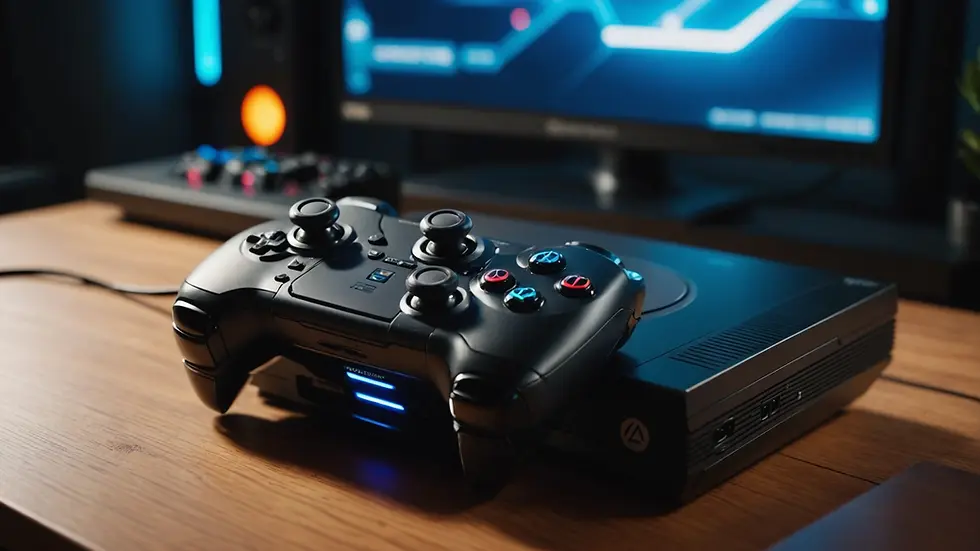Uncover the Shocking Truth: Is Your Console Secretly Spying on You While You Play? Find Out Now!
- jack harlow
- Dec 22, 2024
- 3 min read
In today's digital age, privacy is more important than ever, even when it comes to our gaming consoles. Have you ever asked yourself, "Is my console spying on me?" It’s a haunting thought that your gaming system might be tracking your actions and gathering personal data. What does this mean for your gaming experience? Let’s take a closer look at what’s happening inside your console.
The Tech Behind Your Console
Understanding your gaming console's technology is key to grasping how it might be collecting data. Modern consoles function like mini-computers, equipped with impressive internet connectivity and cloud services.
For instance, systems like the PlayStation 5 and Xbox Series X offer cloud gaming, downloadable content, and seamless multiplayer capabilities. As of late 2023, over 60% of gamers use cloud gaming features, demonstrating the growing reliance on such technology. But this connectivity often leads to data collection.

Data collected can enhance user experiences and tailor advertisements. However, the extent of this information gathering—ranging from gameplay habits to purchase histories—raises questions about what data is being collected and how it is being utilized.
Data Collection Practices
A significant aspect of gaming privacy is understanding data collection practices. According to a 2022 study, nearly 75% of gamers are unaware of the types of data their consoles collect. This information encompasses:
Game Purchase History: What games you buy can influence future recommendations.
Playtime Metrics: How long you play particular games helps in determining your preferences.
In-game Interactions: Your actions during gameplay contribute to analytics.
Voice Chat Logs: Conversations may be recorded for compatibility, but this raises privacy concerns.
Online Friend Interactions: Data about how you interact with friends online is often collated.
These practices are frequently hidden in lengthy terms of service agreements that many users skip over. By being aware of these data collection practices, gamers can better protect their personal information.
The Voice and Video Surveillance Debate
A common fear among gamers is the potential for surveillance through built-in cameras and microphones. For example, consoles like the Xbox One utilize voice commands and video features for game control.
While users might approve voice recording for specific functions, the idea that these devices can act as surveillance tools when not in use is alarming. According to a survey by Cybersecurity & Privacy, 50% of respondents expressed concern about their consoles potentially listening or recording outside of gaming sessions.

While companies like Microsoft claim they do not store personal conversations, the mere potential for misuse raises serious worries about privacy in the gaming space.
What About Your Friends List?
Your console's analysis does not end with your data; it extends to your friends list. Data from your gaming friends can create a profile reflecting not just your habits but their preferences as well.
For example, if you frequently play with the same group, your console may recommend new games based on mutual interests. This interconnected data collection can feel invasive to players who prefer to keep their gaming lives private.
The Role of Gaming Companies
Gaming companies are at the heart of the data conversation. Sony, Microsoft, and Nintendo frequently adapt their data collection practices. They justify these practices by claiming that this information is vital for enhancing services, improving products, and providing a more personalized gaming experience.
However, given that over 80% of data breaches involve personal information, the risk of hacking poses serious concerns. If such valuable data is exposed, it could compromise users' personal information, making it essential for players to be cautious.
Protecting Your Privacy
To safeguard your privacy while gaming, consider the following practical tips:
Review Privacy Settings: Check your console’s privacy settings regularly. You may find options to limit data collection, turn off voice features, and control friend interactions.
Be Mindful of Opt-Ins: Always read the terms of service before enabling features that collect data. Knowing what you're agreeing to can vastly improve your privacy.
Additionally, consider disconnecting your console from the internet when not in use. This simple action can prevent unwanted data collection. Being proactive allows you to enjoy your gaming experience while limiting potential invasions of privacy.
Final Thoughts on Gaming Privacy
The reality of modern gaming is that it comes with complex data practices. By understanding how your console may be spying on you, you can take crucial steps to protect your personal information.
As you immerse yourself in your favorite games, remember to stay vigilant about data collection practices. You can still enjoy your gaming adventures without compromising your privacy. Stay informed, prioritize your security, and happy gaming!




Comments